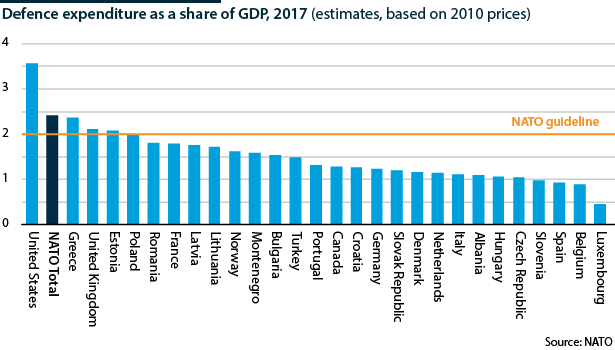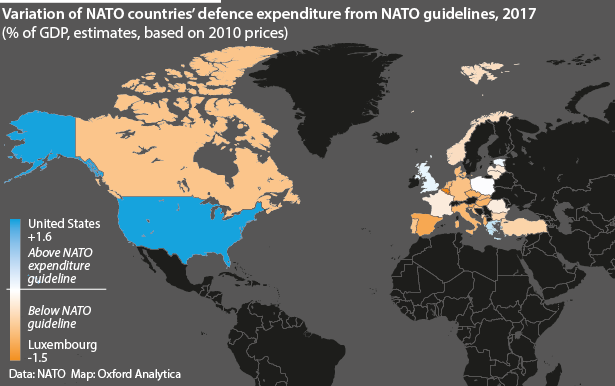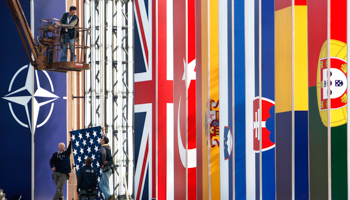NATO summit in July is likely to be fractious
Divergent policies over defence spending among NATO allies are likely to be a cause of disagreement
Heads of NATO member states will convene at the NATO summit in Brussels on July 11-12. The likely summit agenda includes deliverables that will further enhance NATO’s deterrence posture and add new elements to its support for the campaign against Islamic State (IS). However, concerns are widespread that US President Donald Trump will use the summit to castigate his country’s European allies for not sharing fairly the burden of defence spending, especially as transatlantic ties are already strained by the recent US imposition of trade tariffs, which also disrupted the G7 meeting earlier this month.
What next
Burden-sharing among the NATO allies promises to be central to discussions at the summit, and may cause further rifts in the transatlantic relationship. NATO’s European members will argue that significant headway has been made in increasing defence spending, but Trump is likely to call for more.
Subsidiary Impacts
- Following the agreement on the name North Macedonia, that country will formally be put on the path towards NATO membership.
- NATO’s new command structure is likely to be agreed at the summit, heralding an expansion in personnel.
- Summit outcomes may include additional deterrence measures for the Black Sea region.
- NATO will announce that allied defence spending grew by over 4% since January 2017; defence companies could benefit.
- NATO-EU ties will be described as reaching new highs owing to greater military cooperation and efforts to meet 'hybrid' threats.
Analysis
The summit is an important milestone for an alliance facing continued security threats to its east and south. Summits are the one time when NATO members' heads of government meet to agree on decisions that will help shape NATO's future direction.
Transatlantic ties
NATO summits offer opportunities to project an image of unity among the allies. This is seen as an important outcome in itself this time, given the criticisms that Trump has levelled publicly at NATO members which are under-contributing to the organisation. The push for unity among the allies is further complicated by the developing political situation in Turkey, and divergent threat perceptions between Southern and Northern Europe.
Transatlantic ties have also been strained by Trump's decision early in June to introduce steel and aluminium tariffs that affect US allies and NATO members such as Canada, France, Germany and the United Kingdom. US-EU ties also suffered in June when Trump decided to leave the Iran nuclear deal (see PROSPECTS H2 2018: US foreign policy - June 20, 2018).
The Trump administration has increased US defence engagement in Europe through military exercises, a forward presence and the 'pre-positioning' of military equipment in Central-Eastern Europe (see NATO/US: Congress will boost deterrence funds for east - September 14, 2017). Yet the administration's wider foreign policy is causing a rift in the relationship between Washington and its allies, and especially with Berlin (see GERMANY/US: Berlin will reorient its policy - January 23, 2018).
Therefore, this year's summit takes place in a context in which European NATO leaders are questioning the future of the transatlantic relationship, particularly with the United States.
This is unlikely to lead to any nation seriously considering departing NATO. Instead, it may lead to informal alliances and deeper defence cooperation in non-NATO formats, such as nascent moves to create Europe-only defence cooperation schemes.
Rifts within NATO could see other forms of alliance gain new priority
Summit agenda
Defence burden-sharing will top the agenda for this NATO summit, and it will be a leading area of contention.
Discussions about burden-sharing among the allies are as old as the alliance itself (NATO was founded in 1949). However, the issue has assumed new urgency in recent years.
At the 2014 Wales summit, members made a commitment to achieve minimum national defence spending levels of 2% of GDP within a decade.
This discussion has taken on a new tone since Trump's administration began criticising other NATO members for not sharing the defence burden fairly. At the last NATO summit, Trump publicly scolded his fellow allies for not doing enough to achieve fair apportionment across the alliance.
As of 2018, eight NATO allies -- the United States, United Kingdom, Greece, Poland, Lithuania, Latvia, Estonia and Romania -- were already spending the equivalent of 2% of GDP on defence, and others plan to do so by 2024. Yet others, including Germany, have declared that, while they intend to increase their defence spending, they will not reach the 2% threshold by the deadline.
Russia and NATO
The summit will probably also include decisions on further enhancing the alliance's deterrent posture against Russia, with a new command structure that will make NATO better prepared to lead operations and ensure reinforcements across the North Atlantic, along with supporting logistics flows across Europe (see NATO: New commands will support new focus - February 5, 2018).
The new Atlantic command is expected to be hosted by the United States in Norfolk, Virginia. The logistics command would be hosted in Germany.
NATO is likely to endorse a new command structure at the summit
The United States is also leading a readiness initiative that aims to increase the number of ground, air and naval units across the alliance that are ready for action at short notice. This is a response to the low level of readiness of European military forces, which has come under increasing scrutiny over the last few years. Preparedness levels and the state of maintenance in Germany's armed forces has come in for particular criticism both domestically and internationally in recent months.
Counterterrorism operations
NATO's allies are also expected to agree to a new train-and-advise mission in Iraq to support the ongoing campaign to defeat IS and stabilise the region.
This measure is driven by both calls from Trump for NATO to take on a more prominent role in counterterrorism and security concerns among NATO's southern members, including Italy, Spain and Greece. Those countries feel more directly threatened by terrorism and uncontrolled migration than by an assertive Russia under President Vladimir Putin.
The Iraq mission would build on the last NATO summit's decision to deploy command-and-control aircraft to support the campaign against IS in Iraq and Syria, and the creation of a centre in Rome that collects and collates information and intelligence about security threats and operations across the broader Mediterranean.
NATO's role in counterterrorism will still remain limited compared with its efforts to bolster defence and deterrence in Northern Europe.
Outlook
NATO's members are likely to reach consensus on practical proposals for enhancing deterrence and responding to continuing political, security and economic difficulties in parts of North Africa and the Middle East.
This will be important in itself, as an opportunity for the alliance to show unity and display its readiness to respond to the security concerns of both its Northern and Southern European members. On the other hand, the burden-sharing conversation could further strain the transatlantic relationship at the summit and beyond it.
Much will depend on how Trump decides to approach the summit, both publicly and privately. It is widely expected that he will again publicly reprimand his European allies and sow doubt about the US commitment to NATO's collective defence clause.


